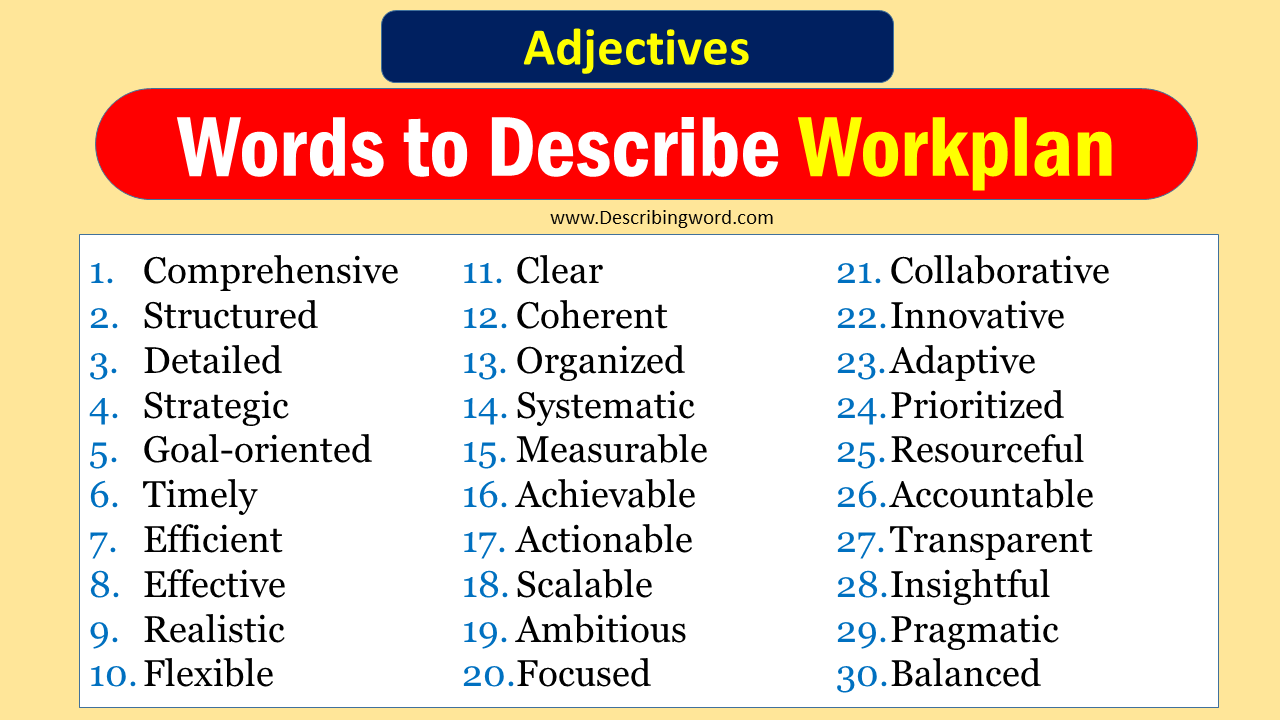A workplan outlines the tasks, strategies, and resources required to achieve specific goals within a project or organization. It serves as a roadmap, detailing what needs to be done, by whom, and by when.
In this lesson, you’ll learn a variety of words and adjectives to describe a workplan. These terms will help you articulate the characteristics, quality, and effectiveness of a workplan, making your communication more precise and impactful.
Words to Describe Workplan
Here are the 30 most common words to describe Workplan:
| Comprehensive | Structured | Detailed |
| Strategic | Goal-oriented | Timely |
| Efficient | Effective | Realistic |
| Flexible | Clear | Coherent |
| Organized | Systematic | Measurable |
| Achievable | Actionable | Scalable |
| Ambitious | Focused | Collaborative |
| Innovative | Adaptive | Prioritized |
| Resourceful | Accountable | Transparent |
| Insightful | Pragmatic | Balanced |
Adjectives for Workplan
Comprehensive
Meaning: Including all or nearly all elements or aspects.
Example: The comprehensive workplan covered every phase of the project.
Strategic
Meaning: Carefully designed or planned to serve a particular purpose or advantage.
Example: Their strategic approach was evident in the workplan.
Efficient
Meaning: Achieving maximum productivity with minimum wasted effort or expense.
Example: The workplan was praised for its efficient design.
Flexible
Meaning: Capable of bending easily without breaking; adaptable to change.
Example: A flexible workplan allows for unforeseen changes.
Measurable
Meaning: Able to be measured or quantified.
Example: Objectives in the workplan were clearly measurable.
Achievable
Meaning: Able to be brought about or reached successfully.
Example: The goals set in the workplan were achievable.
Collaborative
Meaning: Produced by or involving two or more parties working together.
Example: The workplan encouraged a collaborative environment.
Innovative
Meaning: Featuring new methods; advanced and original.
Example: An innovative workplan can lead to breakthrough results.
Prioritized
Meaning: Designate or treat (something) as more important than other things.
Example: Tasks in the workplan were clearly prioritized.
Transparent
Meaning: Easy to perceive or detect; clear.
Example: The workplan was notable for its transparent communication.
Positive Adjectives for Workplan
- Comprehensive
- Strategic
- Efficient
- Flexible
- Measurable
- Achievable
- Collaborative
- Innovative
- Prioritized
- Transparent
Negative Adjectives for Workplan
- Vague
- Unrealistic
- Overwhelming
- Rigid
- Immeasurable
- Unattainable
- Isolated
- Outdated
- Unprioritized
- Opaque
Other Words for Workplan
Here are other words for Workplan:
- Agenda
- Blueprint
- Schedule
- Roadmap
- Strategy
- Framework
- Outline
- Scheme
- Template
- Checklist
- Program
- Guide
- Plan
- Procedure
- Protocol
- Timetable
- Itinerary
- Layout
- Project plan
- Action plan
- Game plan
- Master plan
- Methodology
- Approach
- System
- Workflow
- Process
- Checklist
- Strategy document
- Implementation plan
How to Describe Workplan in Writing?
Describing a workplan in writing requires clarity, precision, and attention to detail. Start by outlining the objectives the workplan aims to achieve, grounding your description in the specific goals and the strategies devised to reach them. Highlight the structure of the workplan, noting how tasks are organized, scheduled, and assigned, ensuring that the reader understands the workflow and the responsibilities of different team members.
Next, focus on the characteristics that make the workplan effective. Discuss its comprehensiveness, flexibility, and how it aligns with broader project or organizational goals. Mention any innovative approaches or tools being used, and how these contribute to the plan’s success. Emphasize the importance of measurability and accountability in tracking progress and achieving outcomes.
Finally, reflect on the adaptability of the workplan. A good workplan is not set in stone; it evolves in response to new information, challenges, and opportunities. Describe how the plan accommodates changes and how feedback mechanisms are integrated to ensure continuous improvement. This adaptability ensures that the workplan remains relevant and effective throughout the life of the project or initiative.
